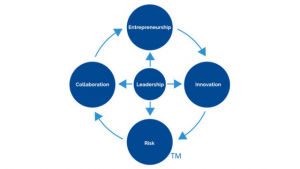Entrepreneurial leaders are necessarily innovative. Why? Because innovation is what entrepreneurs do. This doesn’t mean that to be an entrepreneurial leader you have to create a whole new industry. There may be lightbulb moments but the vast majority of innovation is in fact incremental. It’s not particularly dramatic but the cumulative effect of such minor adjustments can give massive market advantage.
The context may vary – starting a new venture, pitching projects to an internal review board, convincing a new market or managing change in a large organization. Making innovation happen certainly involves developing strategies and skills to recognise opportunities, develop and sharpen ideas, assemble the resources needed, implement the change and capture the value. But whatever the field the greatest underlying challenge is none of these. It is to create an entrepreneurial mindset.
Fostering an Entrepreneurial Mindset.
An entrepreneurial mindset means being able to conceive of new possibilities and then commit to realizing them in a practical fashion so as to both foster and meet a demand. To do this requires a proactive mindset and the ability to offer thought leadership, both one to one and in a social setting. However, success will be dependent on the ability, not just to present, but to elicit from others – be they colleagues or potential clients – their needs, wants, and aspirations and connect these to a vision of possibilities which can be delivered.
To do this effectively requires a number of skills. First, being able to step into another’s shoes and understand how the world looks to them is critical. This is a learnable skill.
Second, being able to elicit the beliefs and values driving any person’s decision making is essential to ensure that provision of any service will produce a high level of customer satisfaction. Again, this is a learnable skill.
Third, at the heart of any such elicitation process is the ability to ask powerful questions. While there is no magic list of the world’s 10 best questions, it is absolutely possible to learn how to ask more powerful questions. This involves increasing (i) the relevancy of the questions you ask and (ii) your calibration skills to pick up the responses your questions elicit.
Fostering an Innovative Mindset
It’s much easier to foster innovative thinking when all parties are aware that every human brain – and thus every team – is capable of continually growing and adapting. (Imagine how hard it would be to be innovative if you didn’t believe your brain could grow and adapt). Therefore, for an individual or a team to be innovative it is useful for people to have some familiarity with the current neuroscience research on the brain’s neuroplasticity.
Critical to the ability to be innovative is having the confidence to innovate and to collaborate.
Three key areas require exploration: where have you been innovative, where do you need to be more innovative and what are the barriers to innovation for you and your team?
Promoting Leadership
Leadership involves being able to take people with you – and that means first being able to meet them where they are right now. Being able first to pace a person before leading them is crucial. Again this is a learnable skill.
This is an important skill given that entrepreneurial leaders are involved in a particular kind of thought leadership: one which offers others new possibilities which can be both scary and exciting. Being able to engage others rather than trigger resistance is therefore crucial.

To see and hear more from Ian McDermott just click on the link:
Ian McDermott on Innovation
If you have an enquiry please Contact Us.





Leave A Comment